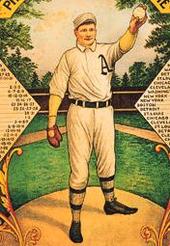1912 Series of Champions T227
Pathé News - The Joe DiMaggio Story
Pee Wee Reese
1888 Goodwin Champions N162
1888 Goodwin Champions N162
Quasimoto - Shroom Music
The Giants win the pennant!
1912 Series of Champions T227
Felix The Cat - Felix Saves The Day
Jimmy Collins - Forget Yesterday © 2004 Grant Smith
1911 Turkey Red Cabinets T3
Hack Wilson - Pauper 191 © 2002 Grant Smith
Ty Cobb - Your Eyes Are Burning Holes Through Me © 2000 Grant Smith
1911 Gold Borders T205
Babe Ruth - The White Josh Gibson © 2003 Grant Smith
1911 Gold Borders T205
Honus Wagner - The Greatest Shortstop Ever © 2002 Grant Smith
1911 Gold Borders T205
Fielder Jones - Sink or Swim © 2005 Grant Smith
Babe Ruth - No No Nanette © 2000 Grant Smith
Roger Maris
1912 Series of Champions T227
Babe Ruth - Headin' Home
Lou Gehrig - The Iron Horse
1909 Ramly Cigarettes T204
Conan O'brien - Old-time Baseball
1909 Ramly Cigarettes T204
Yeah Yeah Yeahs - Live at The Fillmore II
1888 S.F. Hess California League N321
Ty Cobb - Yesterday Went On Too Long © 2004 Grant Smith
Afrika Bambaataa - Planet Rock
Born in 1876 in the northwestern Pennsylvania town of Bradford, George Edward Waddell grew up in a poor farming family. He avoided the schoolhouse as much as possible, but his sister recalled that "I could always find him playing ball, fishing, or following fire engines." By eighteen, he was pitching semi-pro ball in Butler. He quickly established a reputation for going the distance on the mound and in local taverns, and his child-like – some might argue eccentric – habits earned him the reputation as baseball's original flake. Waddell regularly delayed the start of games for a round of marbles with kids outside the park, disappeared between starts to go fishing, and turned up in firehouses in every American League city. "He always wore a red undershirt," Mack recalled, "so that when the fire bell rang he could pull off his coat, thus exposing his crimson credentials, and gallop off to the blaze." During games, opponents would hold up stuffed animals and children's toys to rattle the concentration of a player whose antics were wildly unpredictable. After one particularly hard-earned victory, he turned cartwheels back to the dugout. In the off-season, Waddell added to his quirky legend with unconventional activities that both amazed and alarmed. He wrestled alligators in Florida, played rugby in Michigan, tended bar, toured the nation as an actor, accidentally shot a friend through the hand with a gun, and assaulted his father-in-law with an iron rod on purpose. He managed to marry his second wife without bothering to divorce the first. And he spent more than a few nights in jail. Future Hall of Famer Sam Crawford, a teammate in the minors, loved to relate how Waddell sometimes poured ice water over his pitching arm and shoulder before a game to, quite literally, cool himself down. "I've got so much speed today," Waddell would complain, "I'll burn up the catcher's glove if I don't let up a bit."Despite the ice, Waddell had a knack for burning up opposition hitters, and in 1897, the Louisville Colonels offered him his first sip of the Major leagues. It didn't last long. Fined $50 for drinking, Waddell stormed off after just two games. He returned two seasons later, then bounced up and down between the minors and National League, all the while showing spurts of brilliance. In 1902, Waddell landed with the A’s when Mack gambled that he could rein in Waddell's erratic behaviors and coax to the surface the gold he knew lay buried in Waddell's left arm. For several years Mack succeeded, in part by carefully doling out Waddell's pay in dollar bills on an as-needed basis. (Mack used this method to try and discourage Waddell from blowing his salary on alcohol and other enticements). Waddell repaid his manager handsomely. Along with fellow Pennsylvanians Chief Bender and Eddie Plank, he solidified one of the most efficient rotations in baseball history. In his first four seasons with the club, Waddell contributed 24, 21, 25 and a league-leading 27 victories. Waddell led the American League in strikeouts for six consecutive seasons, setting a major league mark of 349 in 1904 that stood for the next sixty-one years. Once, against the Tigers, he ordered his outfielders to move in, then proceeded to strike out the side. In 1902, he became the first pitcher to strike out the side on the minimum nine pitches. In perhaps his most valiant performance, he bested Cy Young, baseball's most winning pitcher, in a twenty-inning classic on July 4, 1905. But toward the end of that season, Waddell hurt his arm in a silly fight over a straw hat with teammate Andy Coakley, and missed the final month of play and the World Series against Christy Mathewson and the Giants. He was never the same pitcher again. Exasperated with Waddell's drinking and unreliability, Mack finally sold him to the St. Louis Browns before the 1908 season. In July, Waddell humbled his former teammates, tying a major league mark by fanning sixteen players. Six weeks later, he whiffed seventeen Senators in ten innings, out-flaming Hall of Famer Walter Johnson in a 2-1 gem. By 1910, with a career record of 193-143, Waddell had pitched and drunk himself back to the minors where he continued to wind down until 1913, the year before his death
